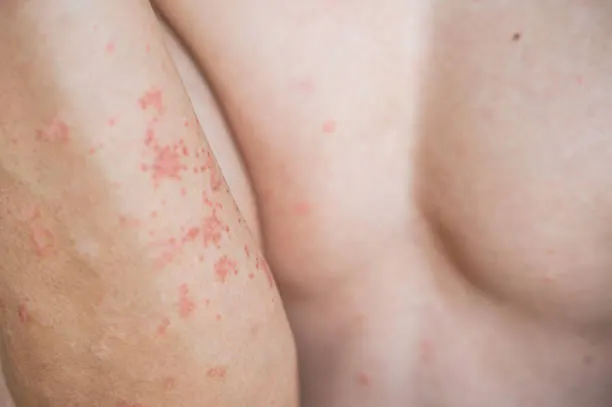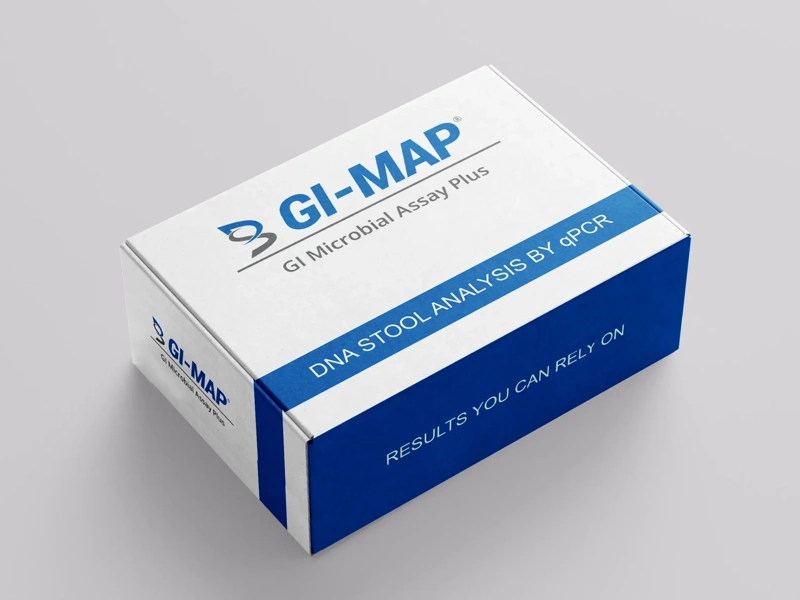
Exploring the connection between gut health and skin is like putting together a puzzle. This article dives into how our digestive system is linked to skin issues like acne, psoriasis, and eczema. By understanding this connection, we can tackle these skin problems from the inside out.
The Connection Between Gut and Skin
The gut-skin axis is a two-way link between gut bacteria and skin health. When our gut bacteria are balanced, our skin tends to be healthier. However, if the balance is disturbed, it can lead to skin issues like eczema, rosacea, and psoriasis. Studies show that changing the bacteria in our gut, maybe by using things like prebiotics, probiotics, and postbiotics, for example, could help treat these skin problems (Thye et al., 2022).
Also, the bacteria in our gut do not just affect our gut; they can also influence other body parts, like our skin and immune system. This tells us how vital these gut bacteria are for our health and keeping diseases away (Li Chunxi et al., 2020). Research is also looking at how our gut bacteria, skin bacteria, and hormones all work together. Understanding these connections could help us find new ways to prevent and treat diseases by focusing on gut bacteria (Maguire & Maguire, 2020).
In short, there is a close relationship between our gut health and the condition of our skin. Keeping our gut bacteria balanced is vital for healthy skin and might be a new way to solve skin problems.

Acne: It is Not Just About the Skin
Acne is indeed more than just a skin issue; it is closely linked to what is happening inside our gut. The concept of the “gut-brain-skin axis” suggests that our emotional states (like stress) can change the balance of bacteria in our gut, leading to increased intestinal permeability and systemic inflammation, which can worsen acne (Bowe et al., 2014). Our diet also influences this relationship, and adjusting what we eat can impact the severity of acne.
Research has highlighted the positive effects of using probiotics to modify the gut and skin microbiota, showing a beneficial influence on acne and other skin conditions (Navarro-López et al., 2021). It has been found that certain bacteria levels, like Bifidobacterium and Lactobacillus, are lower in individuals with acne, suggesting that an imbalance in gut bacteria might be linked to skin conditions like acne (Duan & Jin, 2017).
Taking care of our gut health by eating well and considering probiotics might benefit our digestive system and could also be a critical factor in calming acne down.

Psoriasis: When Inflammation Goes Deep
Psoriasis is not just skin deep; it is deeply connected to what is going on in the gut. The concept of “leaky gut” suggests that when the gut’s protective barrier is compromised, substances can leak into the bloodstream and trigger inflammation throughout the body, including the skin. This systemic inflammation can exacerbate psoriasis.
Research indicates a significant link between the gut microbiota and psoriasis. One study found substantial differences in the gut microbiome composition of psoriasis patients compared to healthy individuals. Certain bacterial strains, such as Faecalibacterium and Megamonas, were found to increase levels in individuals with psoriasis. Moreover, the study noted a correlation between these microbiome variations and inflammation-related indicators in psoriasis patients (Zhang et al., 2021).
Another study highlighted the significance of a particular bacterial strain, Akkermansia muciniphila, found to be reduced in psoriasis patients. This strain is considered a key player in health and might be involved in the pathogenesis of psoriasis and other systemic diseases like inflammatory bowel diseases and obesity (Tan et al., 2018). Healthy levels of Akkermansia muciniphila also support healthy cholesterol levels as well as cardiovascular health.
Furthermore, addressing gut health through specific dietary choices and supplements, like fiber and probiotics, might help manage psoriasis. Probiotics have been shown to positively influence the course of psoriasis by modulating the skin and intestinal microbiota.
These insights suggest that focusing on gut health and considering interventions like dietary changes and probiotics could be a promising strategy for managing psoriasis.

Eczema: A Gut-Skin Team Effort
Eczema, or atopic dermatitis, is connected to our gut health. Imbalances in gut bacteria can lead to an overactive immune system, manifesting as sensitive and irritated skin. Maintaining a healthy gut through diet and a balanced mix of bacteria might offer ways to manage eczema better.
Research supports the idea that a disruption in the gut microbiota (the complex community of microorganisms in our digestive system) is linked to eczema. For instance, specific intestinal microbial species have been shown to influence immune responsiveness, meaning that certain strains among our gut bacteria can either worsen or protect against the progression of eczema. Probiotics, beneficial bacteria, are being explored as a potential therapeutic approach for managing eczema (Kang et al., 2017). Additionally, studies have shown that infants with eczema tend to have lower diversity in their gut bacteria compared to healthy infants, and the composition of the gut microbiota in early life is associated with the development of eczema later on (Forno et al., 2008).
Moreover, the interaction between the gut and the skin, often referred to as the gut-skin axis, shows that the health of our digestive system can be reflected in our skin condition. For instance, certain probiotics have been shown to alter the gut microbiota to help alleviate allergic inflammation, suggesting that they could be a beneficial part of managing conditions like eczema (Kirjavainen et al., 2002).
In conclusion, focusing on gut health and ensuring optimal bacterial levels might offer new avenues for managing eczema more effectively.

Tips for a Healthy Gut and Glowing Skin
- Eat Well: Choose a variety of whole foods. Foods rich in prebiotics (like garlic and bananas) and probiotics (like kefir or kimchi) help keep your gut happy and healthy.
- Eat Mindfully: Stress can mess with your gut and skin. Eating slowly and managing stress can help keep your gut in good shape.
- Stay Hydrated and Clean: Drinking plenty of water is good for your gut and skin. Also, a simple skincare routine can support what you are doing on the inside to help your skin.
- Ask the Experts: Talking to a healthcare professional is a good idea if you are dealing with serious or long-term skin issues. They can offer personalized advice for improving your gut health to help your skin.
In short, there is a strong link between our gut health and our skin. We can work towards a healthier gut and better skin by looking after our gut through diet and lifestyle choices and getting the right advice. This gut-skin connection is an exciting area in health and beauty, showing us that caring for our insides is critical to looking and feeling good on the outside.
Ready to embrace a healthier, more radiant you? At Intrinsic Body Wellness, we believe that the journey to glowing skin and optimal wellness begins from within. Our tailored packages, including the Signature Concierge Package, Signature Basic Package, Elite Signature Concierge Bundle, and Custom Consultation Package, are designed to guide and support you every step of the way.
Discover the transformative power of a balanced gut with our advanced health tests like the GI-MAP™ and personalized plans crafted by our expert, Courtney Bell, RN. Whether you prefer an in-depth video session or an in-person consultation, we’re here to offer the expertise and care you need for a vibrant, balanced life.
Don’t wait to start your journey to wellness. Explore our packages today and take the first step towards a healthier, happier you. Shop Now for your path to intrinsic wellness.
The content provided in this article, including all text, images, and other material, is strictly for informational purposes only. While the information covers the GI-MAP test and its potential benefits, it does not constitute professional medical advice, diagnosis, or treatment. The discussion is not intended to suggest or imply the creation or proposition of individual treatment plans by the author.
As the author, I am not engaged in rendering medical, healthcare, or other professional services through this content. The details shared about the GI-MAP test are meant to foster understanding and knowledge of this particular health assessment and are not to be interpreted as specific medical advice.
I encourage all readers to consult with their healthcare provider, physician, or licensed medical professional regarding any personal health concerns or conditions. No reader should act or refrain from acting based on information provided in this article without first seeking professional advice from a qualified healthcare provider.

